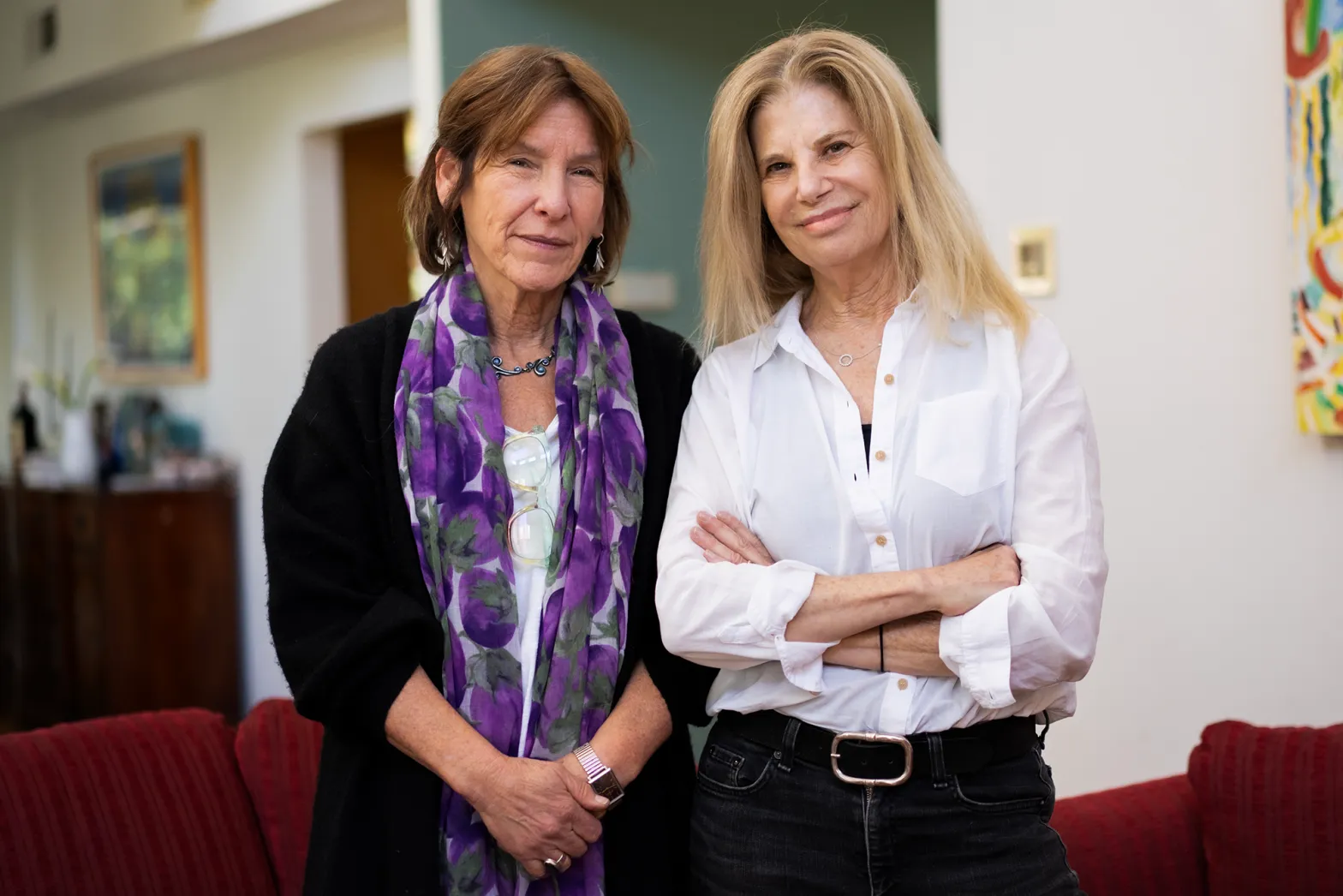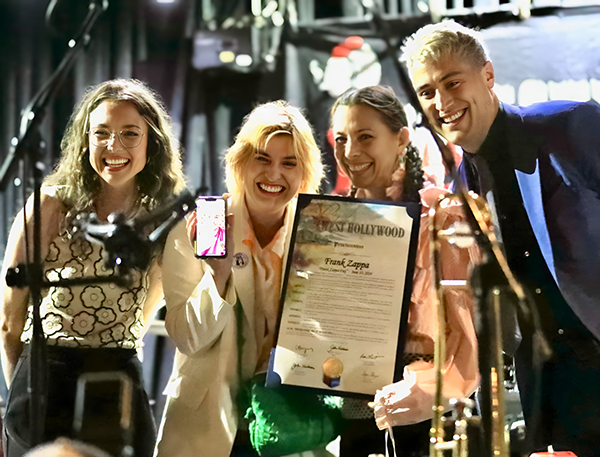Exposing the Limits of California’s ‘Reproductive Freedom’
A proposed clinic that would have performed later abortions was blocked from opening in Beverly Hills. As Gov. Newsom focuses on access for Arizona women, officials are overlooking barriers for providers in California.
By ALEXEI KOSEFF
CALMATTERS
The billboards popped up in January, looming above busy intersections near the city limits of Beverly Hills, where such advertising is banned.
“Los Angeles should be SAFE for abortion seekers,” declared the signs, which depicted a group of four young women of color staring defiantly at passersby. “Fight back against attempts to shut down DuPont Clinic.”
Weeks later, at a forum ahead of Beverly Hills’ March city council election, moderator Andrea Grossman pressed the crowded table of candidates about their position on abortion rights.
“Are you pro-choice, and what is your view about abortion clinics in Beverly Hills?” she asked. “Would you take steps to keep out abortion clinics in the city if there were likely to be disruptive protests?”
Nearly a year after DuPont Clinic — a Washington, D.C., provider that performs abortions into the third trimester and sought to open a clinic in one of California’s wealthiest and most famous communities — lost its lease at a medical center on Wilshire Boulevard, Grossman and a small band of local activists are still laboring to draw a spotlight and stoke a sense of outrage that matches their own.
Despite the sympathetic politics of Beverly Hills, which lit its city hall pink to protest the 2022 U.S. Supreme Court Dobbs decision that overturned a constitutional right to abortion, it has been a struggle. While more than two-thirds of local voters joined Californians statewide that November to enshrine “reproductive freedom” in California’s constitution, few of them now seem to be paying attention to what Grossman calls a “hideous” situation that undermines that very protection.
On a recent afternoon, Grossman sat in her living room with other members of a group they founded last fall to demand attention and accountability for DuPont Clinic — furious that Beverly Hills had failed to stand up to anti-abortion protestors and defend a provider offering a procedure not commonly available elsewhere, and frustrated that liberals remain oblivious to the threats to abortion access in their own backyard.
“In 2023, to have to start Beverly Hills for Choice,” she said, “how crazy is that?”
Reproductive rights have dominated the political landscape across the country since the end of Roe v. Wade and California is no exception. In the wake of the ruling, Gov. Gavin Newsom and other Democratic state leaders vowed to turn California into a “haven” for abortion rights, placing the constitutional amendment, known as Proposition 1, on the ballot and passing dozens of other new laws to protect doctors, expand the number of providers and fund travel for patients.
Just last week, Newsom and the Legislative Women’s Caucus introduced a bill that would allow Arizona abortion providers to temporarily treat their patients in California after a strict abortion ban takes effect in Arizona in June.
But with the heightened focus on accommodating the expected influx of patients from conservative states that banned or restricted abortion, California has largely overlooked the limitations on access in its own borders.
Many counties have no abortion clinics at all. Because the procedure is prohibited once a fetus can live outside the womb (around 24 weeks of pregnancy) except when the life or health of the mother is threatened, most providers will not treat women who need abortions late in their pregnancy, forcing them to leave California for care. There are no gestational limits in nine states and Washington, D.C. — where DuPont Clinic performs abortions up to 32 weeks.
At least two other proposed California abortion clinics have also been blocked from opening in the past two years because of local opposition in more conservative areas: Visalia, one of the largest cities in the Central Valley, and Fontana, the second-most populous city in San Bernardino County.
“We are feeling the backlash of the state taking a very strong stand in support of very strong access,” said state Sen. Toni Atkins, a San Diego Democrat who ushered Proposition 1 onto the ballot. “The more rights people seem to gain, the more those who are directly opposed become more vocal.”
Many counties have no abortion clinics at all. Because the procedure is prohibited once a fetus can live outside the womb (around 24 weeks of pregnancy) except when the life or health of the mother is threatened, most providers will not treat women who need abortions late in their pregnancy, forcing them to leave California for care. There are no gestational limits in nine states and Washington, D.C. — where DuPont Clinic performs abortions up to 32 weeks.
At least two other proposed California abortion clinics have also been blocked from opening in the past two years because of local opposition in more conservative areas: Visalia, one of the largest cities in the Central Valley, and Fontana, the second-most populous city in San Bernardino County.
“We are feeling the backlash of the state taking a very strong stand in support of very strong access,” said state Sen. Toni Atkins, a San Diego Democrat who ushered Proposition 1 onto the ballot. “The more rights people seem to gain, the more those who are directly opposed become more vocal.”
Many counties have no abortion clinics at all. Because the procedure is prohibited once a fetus can live outside the womb (around 24 weeks of pregnancy) except when the life or health of the mother is threatened, most providers will not treat women who need abortions late in their pregnancy, forcing them to leave California for care. There are no gestational limits in nine states and Washington, D.C. — where DuPont Clinic performs abortions up to 32 weeks.
At least two other proposed California abortion clinics have also been blocked from opening in the past two years because of local opposition in more conservative areas: Visalia, one of the largest cities in the Central Valley, and Fontana, the second-most populous city in San Bernardino County.
“We are feeling the backlash of the state taking a very strong stand in support of very strong access,” said state Sen. Toni Atkins, a San Diego Democrat who ushered Proposition 1 onto the ballot. “The more rights people seem to gain, the more those who are directly opposed become more vocal.”
Many counties have no abortion clinics at all. Because the procedure is prohibited once a fetus can live outside the womb (around 24 weeks of pregnancy) except when the life or health of the mother is threatened, most providers will not treat women who need abortions late in their pregnancy, forcing them to leave California for care. There are no gestational limits in nine states and Washington, D.C. — where DuPont Clinic performs abortions up to 32 weeks.
At least two other proposed California abortion clinics have also been blocked from opening in the past two years because of local opposition in more conservative areas: Visalia, one of the largest cities in the Central Valley, and Fontana, the second-most populous city in San Bernardino County.
“We are feeling the backlash of the state taking a very strong stand in support of very strong access,” said state Sen. Toni Atkins, a San Diego Democrat who ushered Proposition 1 onto the ballot. “The more rights people seem to gain, the more those who are directly opposed become more vocal.”
Gay Abrams, a member of Beverly Hills for Choice, said she found the city’s handling of the situation hypocritical, given its public stance in support of reproductive freedom, and she worried that it would empower abortion opponents to use the same strategy elsewhere. Though she understood the heightened sensitivities around a clinic that performs abortions into the third trimester, she said it should not have mattered because of the protections guaranteed by Proposition 1.
“They kowtowed to a group of anti-abortion extremists,” Abrams said. “They betrayed the residents and they betrayed the voters of California. And I think they betrayed people and women all over the country who are in need of safe reproductive health care.”
The Beverly Hills for Choice activists argue that, in the emails they obtained, city officials never consider whether they have an obligation to protect DuPont Clinic’s right to operate. The activists believe the city was primarily concerned with appeasing protestors to avoid the “messiness” that would follow if the clinic opened.
In another series of exchanges, from July 2023, city officials including then-Mayor Gold communicated and set up meetings with Tim Clement, outreach director for Survivors of the Abortion Holocaust, about further protests his group had planned outside the medical center where DuPont was no longer opening. After Clement wrote in an email that “we would be willing to turn our campaign in another direction out of Beverly Hills” if the city would provide a written statement that “DuPont is definitely NOT moving into Beverly Hills City limits,” Deputy City Manager Sterling confirmed that “the lease has been rescinded.”
Survivors of the Abortion Holocaust touts that it shut down DuPont Clinic in Beverly Hills, including with signs at its booth last week at the California March for Life rally at the state Capitol.
“Activism works. It’s meant to cause concern about how this is going to affect your neighborhood,” Clement said in an interview. “But mainly what activism does is make people aware. It exposes what’s in the dark.”
With significant funds sunk into the office renovation, attorney Corpuz said DuPont Clinic still hopes to open in Beverly Hills, but she acknowledged that may never happen.
The Beverly Hills for Choice activists also have their doubts. They wonder whether there will be any accountability for how DuPont was treated.
“I’m looking for people to own up to it,” Grossman said. “I do want more than a slap on the wrist. I don’t know what that looks like.”
Alexei Koseff covers Gov. Gavin Newsom, the Legislature and California government from Sacramento. He can be reached ar ei@calmatters.org
CalMatters.org is a nonprofit, nonpartisan media venture explaining California policies and politics. Published with permission of CalMatters.













